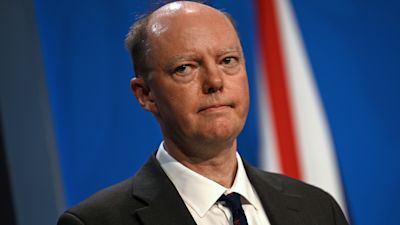Covid: Prof Chris Whitty warns: 'We are not out of the woods yet'

The UK is “not out of the woods yet” and the public should approach the end of coronavirus restrictions next Monday with caution, Professor Chris Whitty has said.
England’s Chief Medical Officer warned that the number of people in hospital with Covid-19 is currently doubling about every three weeks and could reach “quite scary numbers” if the trend continues.
Speaking at a webinar hosted by the Science Museum on Thursday evening, Prof Whitty said: “I don’t think we should underestimate the fact that we could get into trouble again surprisingly fast.”
He added: “We are not by any means out of the woods yet on this, we are in much better shape due to the vaccine programme, and drugs and a variety of other things.
“But this has got a long way to run in the UK, and it’s got even further to run globally.”
The Government’s decision not to mandate the wearing of masks in indoor public spaces in legislation from Monday has caused a lot of controversy.
Listen to the Coronavirus: What You Need To Know podcast here:
But Prof Whitty said the key on July 19 was “to take things incredibly slowly”, adding that he fully expected most people to continue to take precautions.
“If you look over what people have done, and in fact if you look at what people intend to do now, people have been incredibly good at saying, ‘I may be a relatively low risk, but people around me are at high risk, and I’m going to modify my behaviours’,” he said.
He added that people should not be “mesmerised” by the anti-vaxx and anti-lockdown movements.
“Although people who think this is not a big problem and make a lot of noise and get on quite a lot of news channels, actually they are a very, very small minority of the population,” he said.
Many businesses and transport networks have said they will enforce mask-wearing after June 19.
Prof Whitty said that in the medium term, the virus could mutate into a “vaccine escape variant” that could take the UK “some of the way backwards” into the worst days of the pandemic.
“The further out in time we go, the more tools we have at our disposal from science, the less likely that is but you can never take that possibility completely off the table,” he said.
“But you know, science has done a phenomenal job so far and it will continue to do so.”